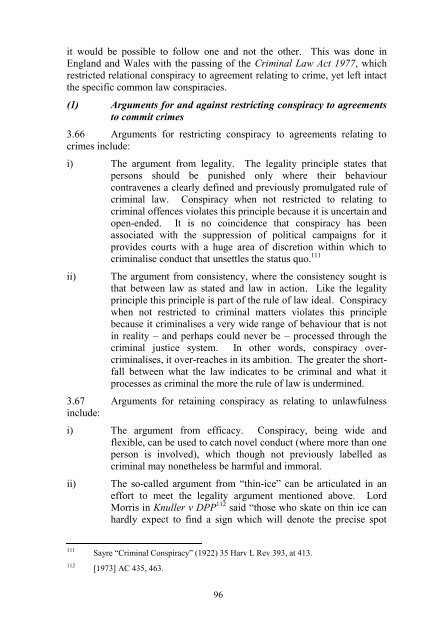Consultation Paper on Inchoate Offences - Law Reform Commission
Consultation Paper on Inchoate Offences - Law Reform Commission
Consultation Paper on Inchoate Offences - Law Reform Commission
You also want an ePaper? Increase the reach of your titles
YUMPU automatically turns print PDFs into web optimized ePapers that Google loves.
it would be possible to follow <strong>on</strong>e and not the other. This was d<strong>on</strong>e inEngland and Wales with the passing of the Criminal <strong>Law</strong> Act 1977, whichrestricted relati<strong>on</strong>al c<strong>on</strong>spiracy to agreement relating to crime, yet left intactthe specific comm<strong>on</strong> law c<strong>on</strong>spiracies.(1) Arguments for and against restricting c<strong>on</strong>spiracy to agreementsto commit crimes3.66 Arguments for restricting c<strong>on</strong>spiracy to agreements relating tocrimes include:i) The argument from legality. The legality principle states thatpers<strong>on</strong>s should be punished <strong>on</strong>ly where their behaviourc<strong>on</strong>travenes a clearly defined and previously promulgated rule ofcriminal law. C<strong>on</strong>spiracy when not restricted to relating tocriminal offences violates this principle because it is uncertain andopen-ended. It is no coincidence that c<strong>on</strong>spiracy has beenassociated with the suppressi<strong>on</strong> of political campaigns for itprovides courts with a huge area of discreti<strong>on</strong> within which tocriminalise c<strong>on</strong>duct that unsettles the status quo. 111ii)The argument from c<strong>on</strong>sistency, where the c<strong>on</strong>sistency sought isthat between law as stated and law in acti<strong>on</strong>. Like the legalityprinciple this principle is part of the rule of law ideal. C<strong>on</strong>spiracywhen not restricted to criminal matters violates this principlebecause it criminalises a very wide range of behaviour that is notin reality – and perhaps could never be – processed through thecriminal justice system. In other words, c<strong>on</strong>spiracy overcriminalises,it over-reaches in its ambiti<strong>on</strong>. The greater the shortfallbetween what the law indicates to be criminal and what itprocesses as criminal the more the rule of law is undermined.3.67 Arguments for retaining c<strong>on</strong>spiracy as relating to unlawfulnessinclude:i) The argument from efficacy. C<strong>on</strong>spiracy, being wide andflexible, can be used to catch novel c<strong>on</strong>duct (where more than <strong>on</strong>epers<strong>on</strong> is involved), which though not previously labelled ascriminal may n<strong>on</strong>etheless be harmful and immoral.ii)The so-called argument from “thin-ice” can be articulated in aneffort to meet the legality argument menti<strong>on</strong>ed above. LordMorris in Knuller v DPP 112 said “those who skate <strong>on</strong> thin ice canhardly expect to find a sign which will denote the precise spot111112Sayre “Criminal C<strong>on</strong>spiracy” (1922) 35 Harv L Rev 393, at 413.[1973] AC 435, 463.96
















